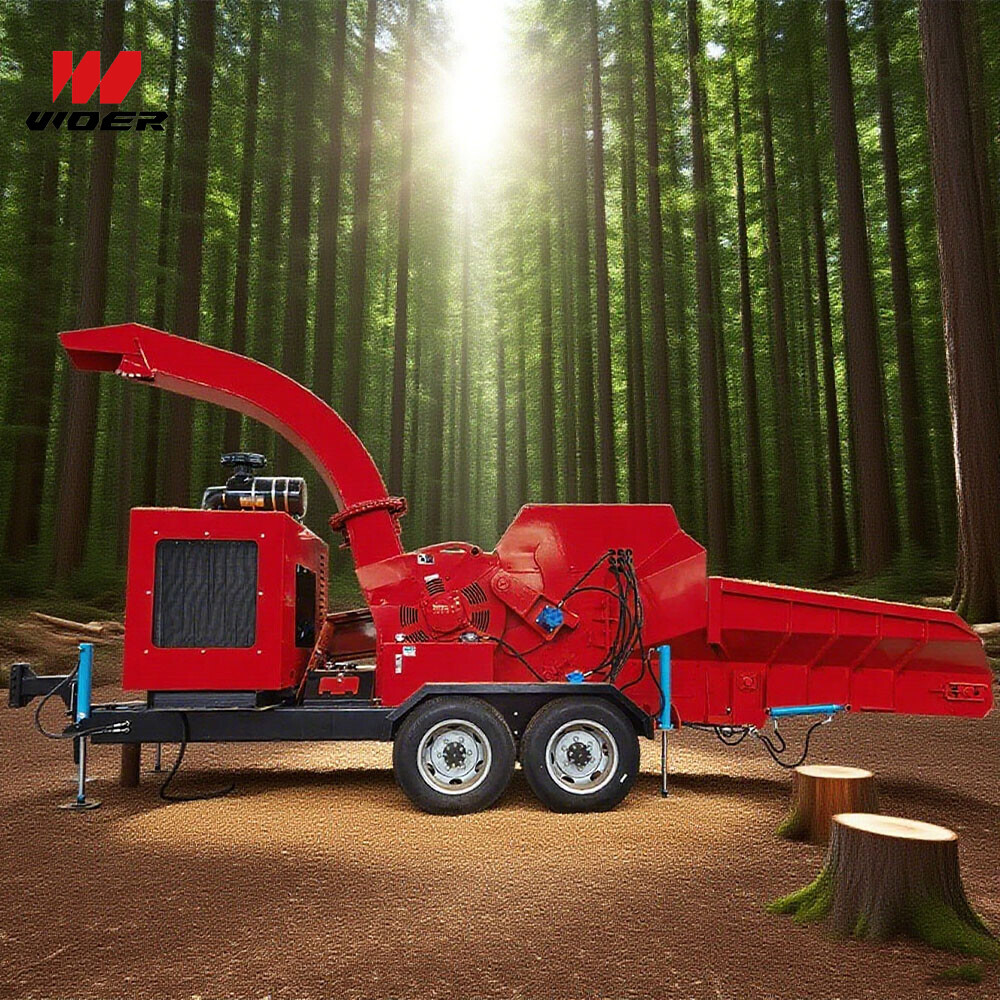Navigation
Contact us
Phone
Message

Industrial Wood Chipper Machine: A Must-Have for Large Projects
Industrial wood chipper machines are indispensable for large-scale forestry, landscaping, and construction projects. These heavy-duty machines, including hydraulic wood chippers and self-feed models, streamline waste management, enhance productivity, and reduce operational costs. This article explores the key features, applications, and benefits of industrial wood chippers, helping you make an informed decision for your next project.
Types of Industrial Wood Chippers
Industrial wood chippers come in various types, each designed for specific applications. The most common types include:
- Hydraulic Wood Chipper: Ideal for heavy-duty tasks, these chippers use hydraulic systems to power the cutting mechanism, offering superior performance and durability.
- Self-Feed Wood Chipper: These machines automatically feed wood into the chipper, reducing manual labor and increasing efficiency.
- Drum Wood Chipper Machine: Known for their high-capacity chipping, drum chippers are perfect for large-scale forestry operations.
- Wood Chipper 6130: A popular model known for its robust design and high output, suitable for commercial use.
Applications of Industrial Wood Chippers
Industrial wood chippers are used in a variety of industries, including:
- Forestry: For processing logs and branches into manageable chips for further use or disposal.
- Landscaping: To clear large areas of vegetation and manage green waste efficiently.
- Construction: For clearing sites and processing wood waste generated during building projects.
- Municipal Waste Management: To handle large volumes of wood waste from urban areas.
Key Features to Consider
When selecting an industrial wood chipper, consider the following features:
- Power Source: Choose between diesel, electric, or hydraulic power based on your operational needs.
- Capacity: Ensure the chipper can handle the volume of wood you need to process.
- Mobility: Look for models with wheels or trailers for easy transportation.
- Safety Features: Prioritize machines with safety mechanisms like emergency stop buttons and feed control.
Benefits of Using Industrial Wood Chippers
Investing in an industrial wood chipper offers numerous benefits:
- Cost Savings: Reduce disposal costs by processing wood waste on-site.
- Increased Efficiency: Automate the chipping process to save time and labor.
- Environmental Benefits: Convert wood waste into reusable mulch or biomass fuel.
- Versatility: Handle a wide range of wood types and sizes with the right machine.
Technical Specifications
Here are some technical specifications to consider when evaluating industrial wood chippers:
Industry Standards and Certifications
Ensure your wood chipper meets industry standards such as:
- ANSI/OPEI B71.9: Safety standards for wood chippers.
- EPA Tier 4 Final: Emissions standards for diesel engines.
- CE Certification: Indicates compliance with European safety and environmental standards.
Cost Analysis and ROI
Investing in an industrial wood chipper can yield significant returns. Consider the following cost factors:
- Initial Purchase Price: Ranges from $10,000 to $100,000 depending on the model and features.
- Operating Costs: Includes fuel, maintenance, and labor.
- ROI: Calculate based on savings from reduced disposal costs and increased productivity.
Common Misconceptions
There are several misconceptions about industrial wood chippers:
- "All chippers are the same." Different models are designed for specific tasks and materials.
- "Small chippers can handle large projects." Industrial projects require heavy-duty machines.
- "Maintenance is not important." Regular maintenance is crucial for longevity and safety.
Why Choose Our Industrial Wood Chippers?
Our industrial wood chippers are designed for performance, durability, and ease of use. With features like hydraulic feed systems and high-capacity chipping, our machines are perfect for large-scale projects. Rechargeable Diesel Commercial Robotic Remote Control Lawn Mower For Sale is just one example of our commitment to quality and innovation. Contact us today to learn more about our products and how they can benefit your operations.
Frequently Asked Questions
Q: What is the difference between a hydraulic and a self-feed wood chipper?
A: Hydraulic wood chippers use hydraulic systems to power the cutting mechanism, while self-feed chippers automatically feed wood into the machine.
Q: How often should I maintain my wood chipper?
A: Regular maintenance should be performed every 50-100 hours of operation, including checking blades, lubricating parts, and inspecting the engine.
Q: Can industrial wood chippers handle wet wood?
A: Yes, but wet wood may reduce efficiency and require more frequent blade sharpening.
Future Trends in Wood Chipping Technology
The wood chipping industry is evolving with advancements in automation, remote control, and eco-friendly designs. Future trends include:
- Automation: Increased use of robotic and remote-controlled chippers.
- Eco-Friendly Designs: More machines with lower emissions and higher energy efficiency.
- Smart Technology: Integration of IoT for real-time monitoring and diagnostics.
Industrial wood chipper machines are a critical investment for large projects. Whether you need a hydraulic wood chipper, a self-feed model, or a heavy-duty drum chipper, understanding the features and benefits will help you make the right choice. For more information on our products, including the Rechargeable Diesel Commercial Robotic Remote Control Lawn Mower For Sale, contact us today.

This stunning beach house property is a true oasis, nestled in a serene coastal community with direct access to the beach.
Contact
West Street, Melbourne Victoria 3000 Australia